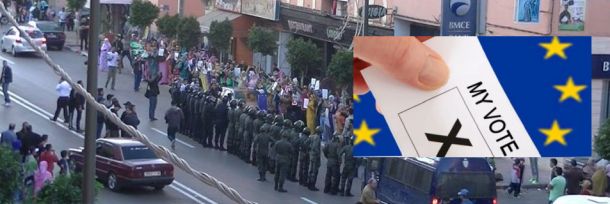Denmark repeats it will vote against EU fisheries in Western Sahara

In a debate in the Danish Parliament 23 June, Danish government repeats that it will object to the EU fisheries in Western Sahara.
Published 24 June 2011
In a debate in the EU Committee in the Danish parliament, 23 June, Minister of Food, Henrik Høegh stated that Denmark will vote no as long as Morocco fails to present more information on the benefits to the people of Western Sahara. The purpose of the debate was to give the Danish government the permission to vote no to the agreement.
"Our concern is still the question regarding receiving information on the benefits to the local population of Western Sahara. We have received no clear info from the Commission", stated Minister Høegh.
"The Commission will probably claim that some initiaitives have been taken in Western Sahara, and that it is moving in the right direction. The Danish position is still, however, that we until today have not yet received sufficient and clear information from Morocco regarding the question on the benefit to the local population under the agreeement. Therefore it is my opinion that Denmark can not support the formal approval. Generally, it is a topic in which we try to assert pressure on the Commission, in order for it to follow the general principles for partnership agreement", the Liberal Party Minister said.
See the statements on the web TV of the Danish parliament (in Danish)
Denmark also voted against further negotiations in February.
The chair of the EU Committee noted that all parliamentarians who took part in the debate, agreed to the Danish government's position to object to the agreement, and the government was thus given the mandate to do so.
A lot of the debate circulated around the lack of transparency around the evaluation report that the EU commissioned on the former 4 year fisheries agreement. The report has revealed that the agreement is both ecologically destructive, and is the less financial viable fisheries agreement that the EU has.
"It is deeply deeply strange that the evaluation reports have to be so confidential. We can hardly make use of these evaluations in a public debate as long as there is so much secrecy around them. In the European Parliament, the evaluations are so confidential that they can only be seen in a locked room, after leaving the mobile phones outside", stated Per Clausen of the Red-Green Alliance.
"The evaluation of the former fisheries agreement, which would have impact on how one would asses a new agreement, has only been presented in French, and with only a 2 page summary in English. That is not sufficient", he said.
"I thought the EU spent a whole lot resources on translations, but that is evidently not the case", stated Social-Democrat parliamentarian Bjarne Laustsen, underlining he didn't understand a word of the French written evaluation report.
Pia Olsen Dyhr, of the Socialist Party, referred to international media that had mentioned that the EU evaluation showed how the fishing takes place violating central UN conventions. She also underlined that the evaluation did not cover aspects of the agreement violating international law.
"A model for renewing this agreement would be to simply make it cover Moroccan waters, and not any other waters", she stated.
Also Social Liberal Party (RV) underlined its support to the government's stance.
"Can we expect, when Denmark takes over the presidency of the EU, that all the evaluations of the European fisheries partnership agreements be published?", asked Clausen.
"We have asked for transparency around these reports, and will do so in the future", said the minister.
News
EU Parliament to hold Western Sahara debates at committee level?
The European Parliament has expressed itself in favour of holding debates in three parliament committees about the exclusion of Western Sahara from EU-Morocco trade agreements.
09 October 2024
Here is the EU Council's legal advice on fishing in occupied waters
Before voting on the new EU-Morocco fish deal in 2018, extending into occupied Western Sahara, several EU Member States asked for legal advice that would determine their vote. WSRW today publishes that influential legal opinion, which appears to miss the ball entirely.
05 March 2020
Hans Corell criticizes EU fisheries in Western Sahara
The former Legal Counsel to the UN Security Counsel, Mr. Hans Corell, comments on the EU's fisheries activities in Western Sahara.
20 November 2019
EU elections: how have candidates voted on occupied Western Sahara?
Are you casting your vote for the EU elections? Find here a complete overview of MEP candidates who have supported the Moroccan occupation of Western Sahara in previous controversial votes. Choose wisely.
17 May 2019


